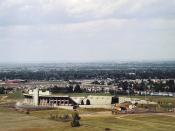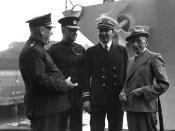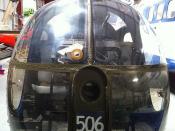"The two jostled her, / Both trying to mount her simultaneously/ As she ran between them and under them/ Hurrying to nibble further." Ted Hughes describes the power of physical desire in both animals and human beings in "Last Night" and "That Girl". "Last Night" discusses the natural and inescapable need to mate in animals, while "That Girl" pokes fun at the consequences of satisfying these urges by means of casual sex. The structure of Hughes' "Last Night" reads more like prose, but Hughes emphasizes the continuation of birth and death by the repetition the image of a lamb. The satirical tone of "That Girl" is enhanced by the contrast between the beautiful girl who sleeps around, and the hairy old man she ends up having a child with.
"Last Night" opens with a mother mourning over one of her dead twin calves, and "The north wind", which "shifted a little", causes the morning dew to pierce through anything with a blistering chill.
These descriptions of the solemn atmosphere convey the initial saddening mood. The mother moves on with the herd, but does not wander far from her decaying lamb's carcass. "She cried for him to follow," and wept for his soul, thus illustrating the ties between mother and offspring. The tone shifts from depressing to anxious as "The grayface and the blackface" rams approach from over an adjacent hill.
The next stanza implies that animals cannot deny their urges to mate: "They came straight on, / Noses stretching forward as if they were being pulled / By nose rings." The next line indicates that the rams had very little understanding of what "was calling" but knew they "could not resist" the temptation of the female. The female is not given a name, like "grayface", which shows the anonymity in...


